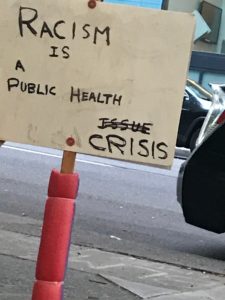“Race is the child of racism, not the father.”
-Ta-Nehisi Coates, Between the World and Me.

BiDil, a combination of isosorbide dinitrate and hydralazine, was approved by the FDA in 2005 to treat heart failure in African Americans— the first race-based indication in the U.S. Though some groups lauded this move as a win for the underserved Black community, controversy soon emerged— and rightly so. Why did the researchers come to the conclusion that this combination of drugs worked better for one racial group than another? Why did the FDA take the action to approve it this way? The answers were not reassuring.
Did you know that there is no genetic basis for discrete racial categories? If not, this is likely because of what you were taught in training. It’s time to unlearn some falsehoods! The concept of race is not, in fact, biological, but social. It is not race, but racism that creates and perpetuates inequities.
Race-based medicine is bad medicine. Period. Dorothy Roberts gave a seminal TED talk in 2015 explaining this concept. The persistent myths that characteristics like pain tolerance vary by race are damaging and false. It is up to us, as clinicians and scientists, to dismantle the racist structures and processes within health care and within our larger communities that harm people of color. We cannot allow the fiction of biological racial difference to obscure the reality of racism.
Race can be an important variable to include, analyze, and understand in science and medicine, but not because of biology— because of structural racism. Diagnosis and treatment should not differ by race. Rather, social determinants of health must be part of all the care we provide, and all the research we conduct. We need to fundamentally reexamine the characteristics we use to ensure diversity and external validity. Yes, we need data on race, that that’s not enough.
As we see stark and alarming differences in COVID-19 among racial groups, the realities of racism’s health impacts are writ large. Living and working conditions, rather than biological differences, drive the differential infection and death rates. We, as the next generation of scientists and clinicians, can seize this moment to create lasting change and move toward health equity.
How?
- Question assumptions. Race-based decisions in medicine are often due to force of habit, tradition, and education. Ask why and if there’s not a good reason, stop. Why do we give race as a defining characteristic in our case presentations? Why do we calculate creatinine clearance differently? Why do we prescribe differently?
- Assess your biases. Try the Harvard bias test, for example. No one is without bias! Seek out training. Eradicate blind spots. Form accountability groups with colleagues. This work can be uncomfortable, but it’s necessary.
- Solicit input. Whether you are a researcher or a clinician, the community you serve needs to be involved. Do not assume you always know what’s best. If you ask, and listen, you will discover the values and priorities of the community. Trust-building takes work and time. Demonstrate trustworthiness and remember that iatrophobia is justified by history.
- In research, define race and specify the reason for its inclusion. Use a sociopolitical rather than biological framework, and name contributing factors. Name racism and related forms of oppression that may be operating[1].
- In clinical care, assess and address social determinants of health. Advocate for equity-focused community practices: food banks, suspension of evictions, support for access to broadband internet to increase access to healthcare and education, and provision of paid time off for sick leave & quarantine, among other actions. Identify needed resources and provide them.[1]
Sustainable change is never straightforward, never easy, and rarely rapid. As early-career professionals, we have many years to fight this fight. Let’s not waste any of them.
References:
[1]Boyd, R., Lindo, E., Weeks, L., & McLemore, M. (2020). On Racism: A New Standard For Publishing On Racial Health Inequities. Health Affairs Blog.
[1] Haynes, N., Cooper, L., & Albert, N. (2020). At the Heart of the Matter: Unmasking and Addressing the Toll of COVID-19 on Diverse Populations. Circulation, 142 (2).
https://www.ahajournals.org/doi/10.1161/CIRCULATIONAHA.120.048126
“The views, opinions and positions expressed within this blog are those of the author(s) alone and do not represent those of the American Heart Association. The accuracy, completeness and validity of any statements made within this article are not guaranteed. We accept no liability for any errors, omissions or representations. The copyright of this content belongs to the author and any liability with regards to infringement of intellectual property rights remains with them. The Early Career Voice blog is not intended to provide medical advice or treatment. Only your healthcare provider can provide that. The American Heart Association recommends that you consult your healthcare provider regarding your personal health matters. If you think you are having a heart attack, stroke or another emergency, please call 911 immediately.”